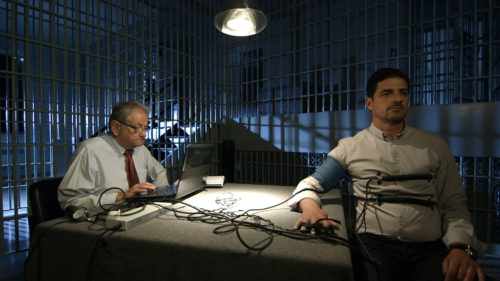How do I prepare for a police polygraph exam?
You are likely nervous if you are scheduled for a police polygraph exam. How should you prepare? What should you expect?

Police Polygraph Examinations – What You Need to Know
Never agree to take or participate in a police polygraph exam without the expert consultation of a qualified criminal defense attorney. Unless a lawyer negotiates favorable terms of any agreement with law enforcement, the polygraph test will almost always cause more problems than it will solve. Police polygraph examiners have dual roles. First, they conduct polygraph tests. Second, they are expert interrogators trained to elicit confessions and incriminatory evidence following the exam. A skilled, experienced defense attorney can neutralize their role as interrogators and investigators, leaving them with the singular role of administrators of the lie detector test. The defense lawyer can restrict their client’s exposure to self-incrimination by limiting the scope of the polygraph examiner and helping the client prepare for a police polygraph examination.
Why should someone take a police polygraph test?
There is seldom a good reason to submit to a police-administered lie detector test. However, sometimes, voluntarily submitting to a law enforcement polygraph can be part of a winning defense strategy if they are prepared, the scope of the test is controlled, and the accused fully understands the process and reason for the test. Before someone agrees to such a test, they must decide to be 100% truthful and willing to answer all questions posted to them. Taking a polygraph test could be a disaster if the accused plans to be honest about or answer some questions but has reservations about being completely truthful or answering other questions that may arise. Think of it this way: people cannot jump off a cliff part-way. Either they do it entirely or not at all. Similarly, someone must be entirely forthcoming and honest or decline a polygraph test. If an expert defense attorney has any reason to believe their client will not do well on the police exam, they frequently have their client take a private exam to assess the advisability of a police exam.
Discussing Medical Conditions is Part of Preparing for a Police Polygraph Examination
One way to prepare for a police polygraph examination is to review your medical history with your defense lawyer. Medical conditions can significantly influence the outcomes of a polygraph exam, given that the test hinges on measuring physiological responses. For instance, cardiovascular conditions such as hypertension or heart disease might cause heart rate variations unrelated to truthfulness or deception, potentially skewing results. Similarly, respiratory problems can impact the breathing rate measurements, one of the primary parameters of a polygraph. Neurological conditions, hormonal imbalances, or the use of certain medications might also lead to atypical physiological reactions.
Consequently, these medical conditions, among others, can confound the readings, making it challenging to distinguish between a genuine physiological response to a question and a symptom of the medical condition. Because of the potential impact on the results, the defense attorney or examinee should inform the polygraph examiner about any medical conditions or medications beforehand to interpret the results accurately. Someone who routinely takes medications should ensure they have taken any prescription medication as directed by their doctor. If someone has a medical condition that causes them to be concerned about how they might perform during a lie detector test, they should discuss it with their lawyer immediately.

Getting a Good Night’s Sleep is Best When Preparing for a Police Polygraph Examination
Part of preparing for a police polygraph examination is getting a good night’s rest. The subject should be fully rested before taking a police polygraph examination. Getting a good night’s sleep before a polygraph exam is essential because the test measures physiological responses that your physical and mental state can influence. A restful night’s sleep ensures you are mentally alert and physically calm. Lack of sleep can elevate stress and anxiety levels, which could produce misleading results. Moreover, fatigue can make it harder to focus, remember important information, and respond appropriately during the test. Hence, to ensure accurate results and reduce the chances of false readings, it’s crucial to be well-rested and in the best possible condition before undergoing a polygraph examination.
Does nervousness affect polygraph results?
No, neither nervousness nor anxiety impacts a police polygraph test. That said, the police officer’s impression of you can be affected by your demeanor. Never take non-prescribed medications or illegal controlled substances to help you relax. Try your best to get some rest the night before the test and eat something so you are not too hungry.
Meeting Your Polygraph Examiner
Do not judge the experience or intelligence of your examiner by the first impression. It would be best if you treated them respectfully. Remember, government polygraph examiners are sworn law enforcement officers or agents. They have experience in interview techniques and frequently have extensive experience in law enforcement. The examiner will do their best to put you at ease and help you to relax. They may joke and act like the polygraph exam is “no big deal.” They figure you will be more talkative if you’re relaxed. Relax, but do not forget why you are having the exam and that the examiner is a police officer. Although your defense attorney might have arranged for the police polygraph exam, the examiner still works for the government and is trying to collect evidence to help their prosecution, if possible. Assume the officer is recording you audibly and visually from the moment you enter the room until you exit after the exam.
Pre-Exam Interview
A pre-exam interview takes place before the actual exam. During this interview, the police polygraph examiner will outline the entire process. Remember to sit quietly and listen. Although you can acknowledge your understanding of their explanations, do not engage in a conversation or volunteer information. As a result of the pre-exam interview, the examiner will formulate the questions for the exam. The examiner should review the questions with you before the test.
Know The Polygraph Equipment
Polygraph examinations, commonly referred to as “lie detector tests,” involve the use of specialized equipment to monitor and record physiological responses from an individual as they answer a series of questions. The underlying principle of the polygraph is that deceptive answers will produce physiological responses different from those associated with non-deceptive answers. The primary components of modern polygraph equipment include:
- A pneumograph measures the subject’s breathing rate and depth. Typically, two pneumograph tubes are placed around the subject’s chest and abdominal area to measure thoracic and abdominal breathing.
- The cardio or blood pressure cuff measures the subject’s heart rate and blood pressure. The cuff, similar to the one used during a typical blood pressure test, is placed around the subject’s upper arm.
- Galvanic Skin Response (GSR) sensors measure the subject’s electrodermal activity (essentially, the sweat gland activity). Small electrodes are attached to the subject’s palm or fingertips. The machine records the conductance of the skin. When a person is stressed or anxious (which may occur when lying), there can be an increase in sweating, leading to a decrease in the skin’s resistance and an increase in its conductance.
- Some polygraph machines include “activity sensors” to detect and record movement. These sensors help examiners determine if the examinee is using physical countermeasures or tactics to try to affect the readings. Usually obtained from internet research, these tricks are not advisable and can lead to a failed test, even if the examinee is truthful.
- Computerized Recording System sensors in modern computerized polygraphs record data digitally. This computerized system can graphically display the physiological responses in real time, and examiners can later analyze the data. Some advanced systems also offer software-based analysis tools that suggest points of interest or potential deception, although human interpretation remains vital.
- Most modern police polygraph equipment includes Questioning Protocol Software that helps guide the examiner with standardized questioning techniques, ensuring consistency and reliability.

Taking The Exam
The actual police polygraph exam, usually consisting of three (3) to five (5) questions, will take approximately 15 to 20 minutes. After being hooked up to the sensors and the blood pressure cuff set, the examiner administers several questions to familiarize you with the equipment and the examiner to your physiological reactions. The preliminary questioning can take 30 minutes to an hour. Afterward, the examiner will administer the actual polygraph examination.
Post-exam Interview
After the exam, the examiner might ask you to leave the room momentarily so they can score the exam. Computers score most modern polygraph test machines in real time. After completing the score, the examiner might share the result, not say anything, or lie to you about the result as an investigation technique. Politely listen to the examiner’s comments but do not respond or discuss the results. Do not engage in a post-polygraph interview! After the examination concludes, invoke your right to remain silent and state that you cannot answer any questions without your lawyer present.
Test Result
Test results are Deceptive (DI), Not Deceptive (NDI), or Inconclusive. The examiner provides a written report to the officer or detective in charge of the investigation and the defense attorney.
Frequently Asked Questions (FAQs) Regarding Polygraph Exams
How does a polygraph test work? Modern polygraph tests operate on the premise that deceptive answers are often accompanied by physiological changes attributed to increased anxiety or stress. A polygraph machine measures and records several physiological indices such as heart rate, blood pressure, respiratory rate, and galvanic skin response (GSR). The GSR measurement is susceptible to emotional arousal, as it tracks the conductivity of the skin, which can increase with sweat gland activity. During a polygraph test, a series of questions are asked, including relevant questions (about the matter under investigation) and control questions (irrelevant to the case but designed to elicit a response). The examiner looks for stronger physiological reactions to relevant questions compared to control questions, interpreting these as potential indicators of deception. However, it is crucial to acknowledge that the polygraph test is not foolproof; it measures physiological responses that can be influenced by various factors, not exclusively deception.
Which physiological conditions do polygraph tests measure and record? Polygraph tests assess physiological responses to detect stress associated with deception, measuring heart rate, blood pressure, and respiratory rate, which tend to elevate in stressful situations. Galvanic Skin Response (GSR) is a crucial component, monitoring the skin’s electrical conductance that increases with sweat gland activity, an involuntary response controlled by the sympathetic nervous system. Some systems also measure additional cardiovascular activity and include movement sensors to track physical movements during the test.
What makes you fail a polygraph? Failing a modern polygraph test typically means that the results indicate deception, which is determined by analyzing the physiological responses recorded during the test. The polygraph measures changes in heart rate, blood pressure, respiratory rate, and galvanic skin response. When a person provides a deceptive answer, it is believed to trigger an involuntary stress response, leading to noticeable changes in these physiological parameters. For example, increased heart rate, blood pressure, skin conductivity, and changes in respiratory patterns might be interpreted as signs of deception.
Can you lie on a polygraph test and still pass? Yes, someone can lie on a polygraph test and still pass. The polygraph measures physiological responses associated with stress and deception, such as changes in heart rate, blood pressure, and galvanic skin response. However, various factors can influence these responses, not just deception. Some individuals might not exhibit the typical stress responses when lying or be able to control their physiological responses to a degree, making it challenging for the polygraph to detect deception accurately.
Additionally, individuals can employ countermeasures—tactics specifically designed to manipulate the results of a polygraph test. These can include physical maneuvers, such as altering breathing patterns or tensing muscles, and psychological strategies, like mentally focusing on calming thoughts or practicing to remain calm under pressure. These countermeasures might help a deceptive individual pass the polygraph test if performed successfully. Anyone submitting to a police polygraph must refrain from attempting countermeasures! If the polygraph examiner determines that the subject is taking measures to alter their physiological responses, they will immediately fail the subject and report to law enforcement their efforts to trick the system. Researching, practicing, or utilizing countermeasures are ineffective, legitimate ways to prepare for a police polygraph examination.

Private Polygraph Examination
Experienced criminal defense lawyers require clients to submit to private polygraph examinations before taking a police polygraph test. Although prosecutors and police officers might not rely on the results from private examiners, the results will help the defense attorney decide whether their client should submit to a government test, what questions to include, and what strategy is best when negotiating with law enforcement regarding the public polygraph questions and terminology. Never agree to a police polygraph without the advice and direction of a skilled, veteran defense lawyer, such as those with LEWIS & DICKSTEIN, P.L.L.C. Please call us for a free consultation. We will take the time to speak with you, answer your questions, and work with you to develop a winning defense strategy. Our top defense attorneys will find a way to help you!
Call us today at (248) 263-6800 for a free consultation or complete an online Request for Assistance Form. We will contact you promptly and find a way to help you.














